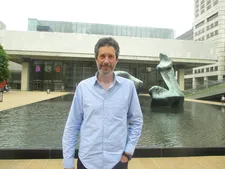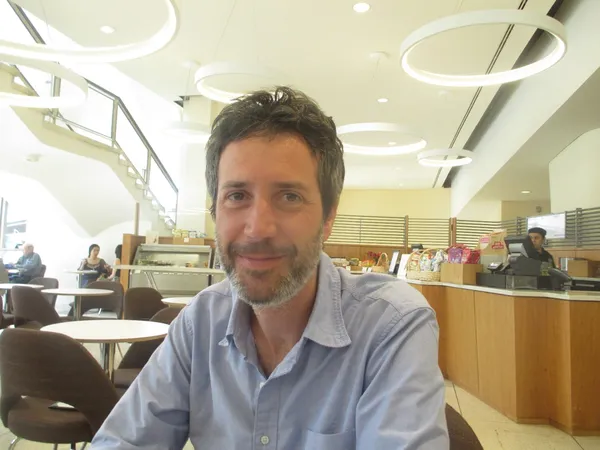 |
| Antonin Baudry on submarine films, Claude Lanzmann and Wolfgang Petersen's Das Boot: "That was his favourite. It's my favourite too. For some reason it really moved him." Photo: Anne-Katrin Titze |
The morning after the US première of The Wolf's Call (Le Chant Du Loup), shot by Pierre Cottereau, starring François Civil with Omar Sy, Mathieu Kassovitz, Reda Kateb, Jean-Yves Berteloot, Damien Bonnard, and Paula Beer at the French Institute Alliance Française in New York, the director/screenwriter Antonin Baudry, aka Abel Lanzac, joined me for a conversation inside David Geffen Hall at Lincoln Center.
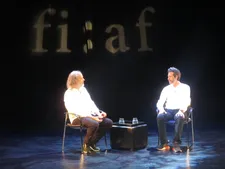 |
| Kent Jones with Antonin Baudry following the French Institute Alliance Française première of The Wolf's Call (Le Chant Du Loup) in New York Photo: Ed Bahlman |
When I mentioned to Antonin that I will be introducing Hélène Fillières' Volontaire (Raising Colors, starring Diane Rouxel, Lambert Wilson, Alex Descas) this Tuesday at FI:AF, he told me that they were actually shooting their French Navy films at the same time and that their crews and cast crossed paths at the airport.
The Wolf's Call, Antonin Baudry's formidable directorial début, tautly edited by Saar Klein and Nassim Gordji Tehrani, is in equal parts nuclear submarine thriller and reflection on chance, codes, and human responsibility under pressure. François Civil plays Chanteraide, a young man who works as a "Golden Ear" for the Navy. He is trained to recognize and identify the sounds in the ocean - be it animal, drone, or manned submarine of another nation. He has the full trust of his commander Grandchamp (Reda Kateb) and the second-in-command D'Orsi (Omar Sy), despite and maybe because of the fact that mistakes can happen to the best.
There is poetry under the sea and the men are tested to the limit when the fate of the world is at stake. A chance encounter on land with Diane aka Prairie (Paula Beer), the owner of a bookshop, who enchants Chanteraide, unwittingly gives an upside down clue to a military riddle. The thrill is out there at sea and so is your conscience.
Anne-Katrin Titze: You were joking with Kent [Jones] last night about Claude Lanzmann's fascination with submarine films. Did you have a conversation with Lanzmann about submarines?
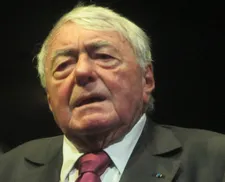 |
| Antonin Baudry on Claude Lanzmann: "He was a very close close friend. We really had a sort of father and son relationship together." Photo: Anne-Katrin Titze |
Antonin Baudry: So many of them! He was a very close close friend. We really had a sort of father and son relationship together. And he was passionate about submarine films. And when I started to do the movie, he was like [Antonin gives a very good impression of Lanzmann's voice] "I want to be your first assistant!"
And I was like, "Claude, don't". He was at the video club I mentioned, which is a great video club in Paris, he was renting all the submarine films and watched them. One month later he re-watched them all and he'd call me. [In Lanzmann's voice again]: "Did you see this film? It's better in this and this scene is cool." And I was like, "Yeah, Claude, but I'm doing my … I can't."
AKT: He was doing research for you!
AB: Yeah. He was like [here comes the voice]: "But I watched this film all night for you! And you don't even care."
AKT: You are a very good impersonator.
AB: He wanted to talk about it. He was in tears each time he was watching a submarine film. I mean not all of them. But especially Das Boot, you know, the [Wolfgang] Petersen film?
AKT: I do.
AB: That was his favourite. It's my favourite too. For some reason it really moved him.
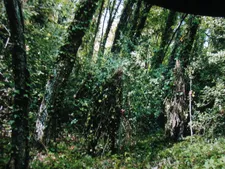 |
| Michelangelo Frammartino's Alberi inside the VW Dome at MoMA PS1 Photo: Anne-Katrin Titze |
AKT: I actually know the set of that film very well. During my studies, I worked as a tour guide in the film studio where they shot Das Boot and they had the model there. I could jump through this submarine for a while the way the sailors do it in the movie.
AB: That's cool.
AKT: I remember very much the claustrophobia, being in this thing. That's the closest I've been to being in a submarine. Your film isn't that claustrophobic.
AB: That's right.
AKT: I was a bit worried, when I heard what your film was about. Will I be able to breathe? But you didn't go for that.
AB: Not especially. It wasn't what interested me most, because it wasn't what I had felt when I spent all these days and weeks in the water in a submarine. I didn't feel claustrophobic. I tried to understand why. In my case, I think I can have claustrophobic feelings. It's when I'm in a tiny space with a door or a window that I would like to open because it would allow me to go in a larger space.
In the case of this submarine, you're in a tiny space related to another tiny space and another and another - that's seven floors. You know, the submarine, it's huge. It's like 100 meters long, with seven floors. It's like a small universe that has its own complexity.
AKT: Like a spaceship?
AB: Yeah. You never felt like, "Open this door!" I felt like every move was uneasy.
AKT: Uneasy?
AB: Uneasy because you have to touch a lot of people. So I felt more of the density and intensity of relationships, rather than claustrophobia.
AKT: You show that well. The relationship between the people in this space is super important, the choreography of how they are moving, how they are touching or not touching.
AB: I took a choreographer actually to work on that with my actors. In the beginning the actors were like, what's that? They usually work more with their head rather than their body.
In this case I wanted to have a real choreography to feel that they're a team, that they know each other very well and can act in synch. After these sessions of choreography I felt like I really had a crew, a real submarine team.
AKT: You mentioned last night that it was a snake hissing and a lion's roar that were used for the sound of the torpedo. I recently had a conversation with a sound editor [Ira Spiegel] and I asked about using animal sounds. He said he always does. For a door closing he uses a cat [I make the sound].
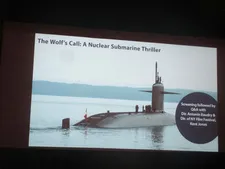 |
| The Wolf's Call at the French Institute Alliance Française in New York Photo: Anne-Katrin Titze |
AB: That's funny. I love ambiguous sounds. I love the sounds where you don't know if it's an organic sound or a machine.
AKT: Which is very much a topic of your film.
AB: Exactly. I love that. Even for music.
AKT: There lies the poetry of it. The wolf's call. It's a wolf's call! Which becomes a frightening title once you know what it refers to. Was that always your title?
AB: Yes, in French it's Le Chant Du Loup and it was always the title. All this universe was very poetic to me.
AKT: In the beginning you have the disguise idea also visually. The first time we see the submarine we are not sure. Is it a submarine or is it a big whale? And then you have the disguised soldiers as trees.
AB: Exactly.
AKT: Although it's the military, it reminded me of Michelangelo Frammartino's film Alberi. Do you know it?
AB: No.
AKT: It's about an old Italian tradition in a village where once a year the men disguise themselves as trees and have a procession through the village.
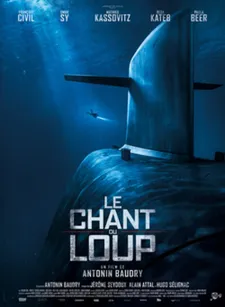 |
| Antonin Baudry on Le Chant Du Loup: "It was always the title. All this universe was very poetic to me." |
AB: Something that fascinated me from the beginning was that humans can be hidden by animals can be hidden by machines. The fact that you are in a world where you don't know what's around. In the submarine you got the sea around you and you don't know what's in there. You have got to imagine and make hypotheses and see signs.
I think it's really like the original situation of human beings. When you're just a newborn, I'm sure you perceive the world this way. You don't know what's around you. You see things but they aren't even things. They are signals or something.
And you're trying to understand what's related to what, what sound is related to what image. In this first stage of confusion you are exactly in the situation the submarine people are. That's what I wanted to recreate in the first part of the movie.
AKT: And in the end, some kind of strange birth situation?
AB: Exactly.
AKT: Mistakes, making mistakes and being able to redo things is very important in your film.
AB: That's right. You are the first one to tell me that. It's very very true.
AKT: There are other chances, making mistakes is a part of it.
AB: Wow, it's great that you saw that. No one saw that before you. It's really my life. Making mistakes and trying to repair them. Desperately.
AKT: That's also what leads you in all these different directions and to do things other people wouldn't do. Maybe you're not afraid to make mistakes because you made so many already and you know there is another possibility coming your way?
AB: And there will be another mistake after.
Coming up - Antonin Baudry on following protocol, footwear, Bertrand Tavernier and Quai d'Orsay, sacrifice, the yellow watch, Reda Kateb, Paula Beer, and the Golden Ear.








